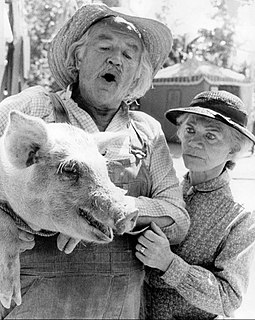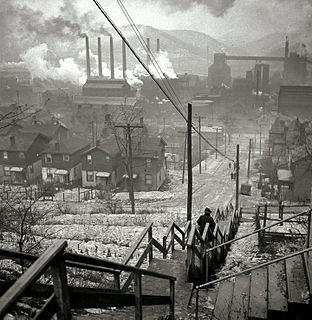Related Research Articles

Woodrow Wilson Guthrie was an American singer-songwriter, and one of the most significant figures in early American folk music. His work focused on themes of American socialism and anti-fascism. His music includes songs such as "This Land Is Your Land", written to oppose the American exceptionalist song "God Bless America", and has inspired several generations both politically and musically.

Bound for Glory is a 1976 American biographical film directed by Hal Ashby and loosely adapted by Robert Getchell from Woody Guthrie's 1943 partly fictionalized autobiography Bound for Glory. The film stars David Carradine as folk singer Woody Guthrie, with Ronny Cox, Melinda Dillon, Gail Strickland, John Lehne, Ji-Tu Cumbuka and Randy Quaid. Much of the film is based on Guthrie's attempt to humanize the desperate Okie Dust Bowl refugees in California during the Great Depression.

Will Geer was an American actor, musician, and social activist, who was active in labor organizing and other movements in New York and Southern California in the 1930s and 1940s. In California he befriended rising singer Woody Guthrie. They both lived in New York for a time in the 1940s. He was blacklisted in the 1950s, by Hollywood, after refusing, in testimony before Congress, to name persons who had joined the Communist Party.

Gilbert Vandine "Cisco" Houston was an American folk singer and songwriter, who is closely associated with Woody Guthrie due to their extensive history of recording together.
"Deportee " is a protest song with lyrics by Woody Guthrie and music by Martin Hoffman detailing the January 28, 1948 crash of a plane near Los Gatos Canyon, 20 miles (32 km) west of Coalinga in Fresno County, California, United States. The crash occurred in Los Gatos Canyon and not in the town of Los Gatos itself, which is in Santa Clara County, approximately 150 miles away. Guthrie was inspired to write the song by what he considered the racist mistreatment of the passengers before and after the accident. The crash resulted in the deaths of 32 people, 4 Americans and 28 migrant farm workers who were being deported from California back to Mexico.
"The Titanic" is a folk song and children's song. "The Titanic" is about the sinking of RMS Titanic which sank on April 15, 1912 after striking an iceberg.

Dust Bowl Ballads is an album by American folk singer Woody Guthrie. It was released by Victor Records, in 1940. All the songs on the album deal with the Dust Bowl and its effects on the country and its people. It is considered to be one of the first concept albums. It was Guthrie's first commercial recording and the most successful album of his career.
"Worried Man Blues" is a folk song in the roots music repertoire. It is catalogued as Roud Folk Song Index No. 4753. Like many folk songs passed by oral tradition, the lyrics vary from version to version, but generally all contain the chorus "It takes a worried man to sing a worried song/It takes a worried man to sing a worried song/I'm worried now, but I won't be worried long." The verses tell the story of a man imprisoned for unknown reasons "I went across the river, and I lay down to sleep/When I woke up, had shackles on my feet", who pines for his lost love, who is "on the train and gone." The melody in 4/4 timing has a strong resemblance to "The Battle Hymn of the Republic", which is in 6/8 timing.

Bound for Glory is the partially fictionalized autobiography of folk singer and songwriter Woody Guthrie. The book describes Guthrie's childhood, his travels across the United States as a hobo on the railroad, and towards the end his beginning to get recognition as a singer. Some of the experiences of fruit picking and a hobo camp are similar to those described in The Grapes of Wrath.

American singer-songwriter Woody Guthrie's published recordings are culled from a series of recording sessions in the 1940s and 1950s. At the time they were recorded they were not set down for a particular album, so are found over several albums not necessarily in chronological order. The more detailed section on recording sessions lists the song by recording date.

"Ludlow Massacre" is a song by Woody Guthrie about the Ludlow Massacre, a labor conflict in Ludlow, Colorado, in 1914. A related song is the "1913 Massacre".

Folkways: A Vision Shared - A Tribute to Woody Guthrie & Leadbelly is a 1988 album featuring songs by Woody Guthrie and Lead Belly interpreted by leading folk, rock, and country recording artists. It won a Grammy Award the same year.
"Grand Coulee Dam" is an American folk song recorded in 1941 by Woody Guthrie. He wrote it during a brief period when he was commissioned by the Bonneville Power Administration to write songs as part of a documentary film project about the dam and related projects.

Woody At 100: The Woody Guthrie Centennial Collectionis a 150-page large-format book with 3 CDs containing 57 tracks, including Woody Guthrie's most important recordings such as the complete version of "This Land Is Your Land," "Pretty Boy Floyd," "I Ain't Got No Home in This World Anymore," and "Riding in My Car." The set also contains 21 previously unreleased performances and six never-before-heard original songs, including Woody's first known—and recently discovered—recordings. It is an in-depth commemorative collection of songs, photos and essays released by Smithsonian Folkways in June 2012.
Released in 2005, Folkways: The Original Vision is an expanded rerelease of the 1989 album Folkways: The Original Vision, created by Smithsonian Folkways to document the origins of the Folkways Records label. The rerelease was created on the 15th anniversary of the original album, and included enhanced liner notes and six bonus tracks.

"Pittsburgh Town", sometimes titled as "Pittsburgh" or "Pittsburgh is a Great Old Town", is a folk song written by Woody Guthrie and originally recorded by Pete Seeger. The song was written during a Pittsburgh, Pennsylvania stop on an Almanac Singers' tour; both Seeger and Guthrie were members of the band at this time. The song speaks of the labor and environmental problems that the city was facing in 1941, when the song was written. In the time since, environmental legislation has reduced the pollution problem that plagued Pittsburgh; because of this, the song's mentions of pollution in Pittsburgh have been sometimes been replaced with verses extolling the city.
"Jesse James" is a 19th-century American folk song about the outlaw of the same name, first recorded by Bentley Ball in 1919 and subsequently by many others, including Bascom Lamar Lunsford, Vernon Dalhart, Woody Guthrie, Pete Seeger, The Kingston Trio, The Pogues, The Ramblin' Riversiders, The Country Gentlemen, Willy DeVille, Van Morrison, Grandpa Jones, Bob Seger, The Nitty Gritty Dirt Band, Carl Sandburg, Sons of the Pioneers, Johnny Cash, Liam Clancy, Mungo Jerry and Bruce Springsteen. Members of the Western Writers of America chose it as one of the Top 100 Western songs of all time.
Logan Eberhardt English was an American folk singer, poet, actor, and playwright. As MC at Gerde's Folk City in Greenwich Village, he was influential in Bob Dylan's early career, and also recorded one of the earliest albums produced as a tribute to Woody Guthrie.

Bound for Glory is a 1956 album by Woody Guthrie and Will Geer. It consists of a selection of songs from Guthrie's Dust Bowl Ballads of 1940 and his Asch recordings of 1944–45, each introduced briefly by Geer with spoken relevant extracts from Guthrie's writings.
"Vigilante Man" is a song by Woody Guthrie, recorded and released in 1940 as one of his Dust Bowl Ballads.
References
- ↑ Woody Guthrie Lyrics
- ↑ Woody Guthrie, quoted by Millard Lampell, liner notes for Bound For Glory: The Songs and Story of Woody Guthrie , FOLKWAYS FA 2481, 1956, p. 8.